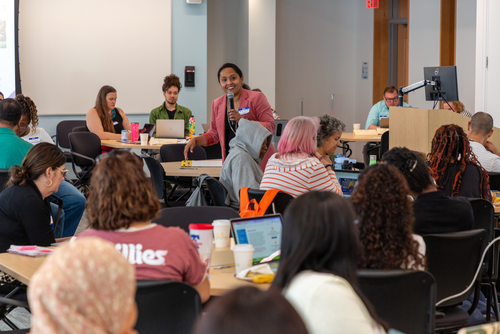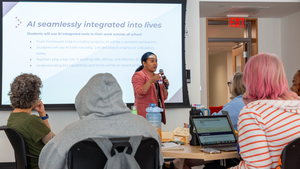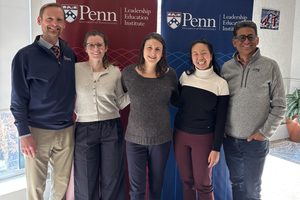It was the second-to-last Wednesday before Philadelphia public schools returned to the classroom, but already teachers from across the city had assembled to start preparing—not only for the year ahead but for the future to come.
“We’re all trying to figure out AI together,” said Betty Chandy, Director for Online Learning at the Graduate School of Education’s Catalyst Center. “So let’s get started.”

Tactical Approaches to New Tech
Chandy and L. Michael Golden, Penn GSE’s Vice Dean of Innovative Programs & Partnerships, are co-leaders of the Pioneering AI in School Systems (PASS) program, which began this year with support from the Marrazzo Family Foundation. The program is a partnership between Penn and the School District of Philadelphia, and it examines both the undeniable influence of AI on modern learning and how schools may navigate its promises and perils.
“Artificial intelligence is already everywhere,” says Golden. “We recognized that in order to help people understand AI and how to think about it, we needed to help build out basic capacities on several levels, from governance and policy to oversight to practical applications.”
Based on these areas of need, Golden and Chandy teamed up with the District to develop three tiers of engagement: district leadership, school leaders, and educators. The program’s tiered structure distinguishes it from others across the country, point out Golden and Chandy, and enables each cohort to dig in to specific aspects of emerging AI. Sessions began in April of this year and will continue with additional programming for teachers through September.
"The PASS program is an example of how two institutions with distinct strengths and shared goals can create positive change in our schools. Supporting this program means, for me, supporting the future of our students and classrooms," said Jeff Marrazzo, C’00, ENG’00, WG’08.

Philadelphia Partnerships
Like many school districts across the country, Philadelphia already allows students to securely access AI technologies on district devices. Beginning in kindergarten, students can use Adobe Firefly to generate graphics; beginning in ninth grade, students can access Google Gemini to generate everything from summaries and written drafts to images.
At the educator sessions, teachers came prepared with observations and questions: “How do we help kids find their own writing voice even if they’re using AI?” “How can we encourage tech literacy without kids becoming dependent?” “How can we teach kids to turn to friends rather than chatbots?”

The room agreed on one thing: no matter the grade or subject, some form of AI is already there. “The point is that you may choose or not to use AI, but students will be using it on their own time,” says Chandy. “And because of that, there is an AI literacy piece that is essential to the classroom.”
During a break in the session, Fran Newberg, Deputy Chief at the Office of Educational Technology, talked with teachers and took a moment to reflect on the power of the partnership: “Penn brings a standard of excellence and research. We bring the expertise of our practitioners and the reality of the classroom. When we center these big initiatives together, great things happen.”

On the Horizon
PASS has local roots, and Golden and Chandy plan to continue incorporating feedback from the district as the 2025–2026 school year gets underway. Next year, they see the potential opportunity to begin assisting other districts with similar initiatives.
In Golden’s words, “Our work endeavors to approach AI literacy and education from the perspective of the ‘whole child,’ and that means there’s a role for everyone—leaders, teachers, administrators, students, parents. When we work together, we have the opportunity to get this right.”
Media Inquiries
Penn GSE Communications is here to help reporters connect with the education experts they need.









